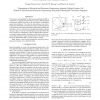Free Online Productivity Tools
i2Speak
i2Symbol
i2OCR
iTex2Img
iWeb2Print
iWeb2Shot
i2Type
iPdf2Split
iPdf2Merge
i2Bopomofo
i2Arabic
i2Style
i2Image
i2PDF
iLatex2Rtf
Sci2ools
100
Voted
ICASSP
2009
IEEE
2009
IEEE
Blind system identification for speech dereverberation with Forced Spectral Diversity
The common zeros problem for blind system identification (BSI) is well known. It degrades the performance of classic BSI algorithms and therefore imposes the limit on the performance of subsequent speech dereverberation. The effect of near-common zeros has recently been studied in terms of channel diversity and the degradation in performance of BSI and multichannel equalization algorithms has been shown. We now introduce a novel approach to improve channel diversity which we refer to as Forced Spectral Diversity (FSD). The FSD concept uses a combination of spectral shaping filters and effective channel undermodelling. Simulation results show that the proposed approach achieves improved performance with reduced complexity for multichannel BSI in a room acoustics example.
Channel Diversity | Classic Bsi Algorithms | Common Zeros Problem | ICASSP 2009 | Signal Processing |
| Added | 21 May 2010 |
| Updated | 21 May 2010 |
| Type | Conference |
| Year | 2009 |
| Where | ICASSP |
| Authors | Xiang Lin, Andy W. H. Khong, Patrick A. Naylor |
Comments (0)

